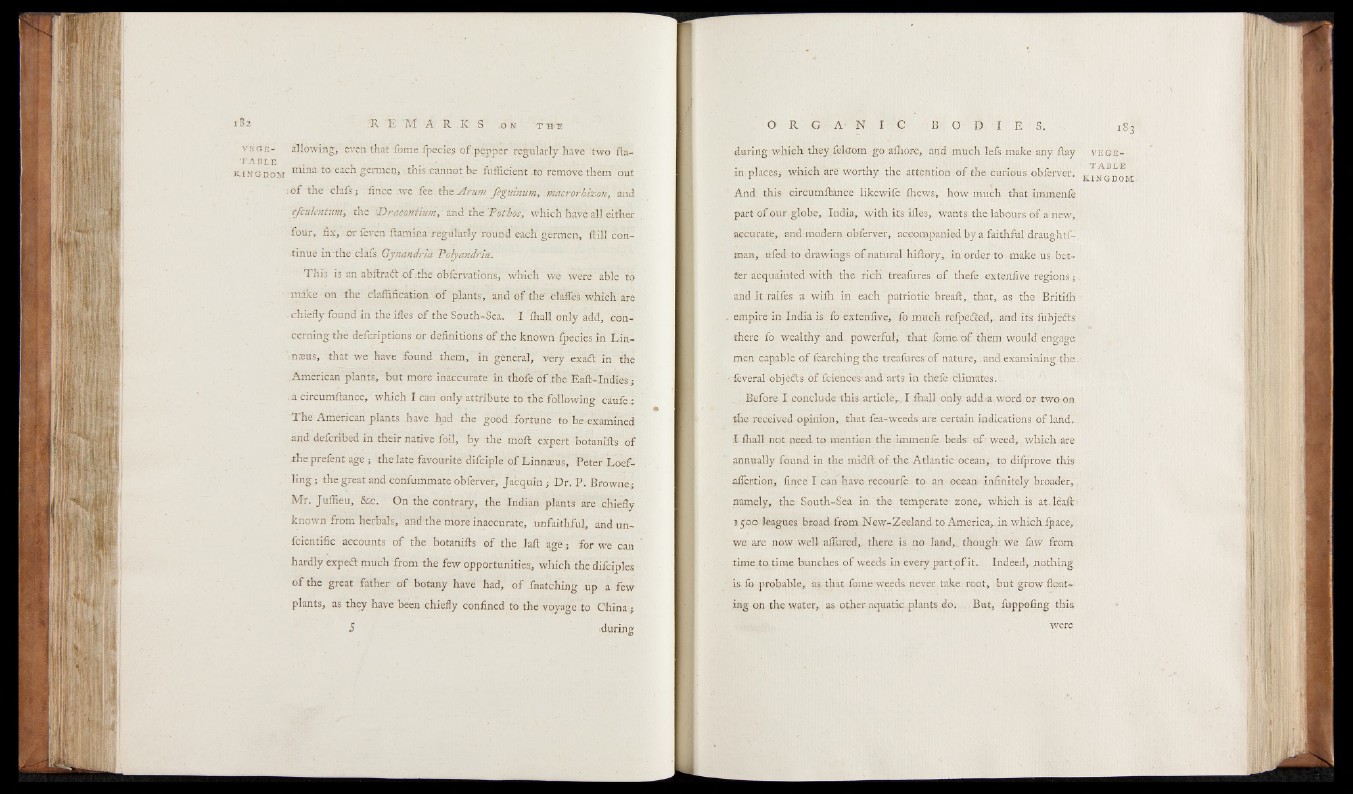
v e g e - allowing, even that fome,fpecies of'pepper regularly have two fta-
TA BLE . ■ ' i . V
kingdom minatoe;lca) gennen, tnis .cannot be fufficient to remove them out
; of the clafs; fince .we fee the jlru tn jeguinum, inkerovhizon, and
efculentum, the DraaoMium, and the Pothos, which have all either
four, fix, or feven ftaminavregulafly round each germen, fell continue
in the clafs Gynandria Tdolyandriai.
This is an abffratft ofthe obfervations,; which we were able to
make on the claffification -of plants, and of the’ clafles which are
chiefly found in theifles of the South-Sea. I lhall only add, concerning
the deferiptions or definitions of the known fpecies in Lin-
Inteus, that we have found them, in general, -very exadt in the
- American plants, but more inaccurate in thofe ofthe Eaft-Indies .;
m circumflance, which I can only attribute to the following caufe t
The American plants have had the good fortune to be-examined
and deferibed in their native foil, by the moft expert botanifts of
the prefent age; the late favourite difciple of Linnaeus, Peter Loef-
ling; the great and confummate obferver, Jacquin; Dr. P. Browne.;
Mr. Juffieu, &c. On the contrary, the Indian plants are chiefly
known from herbals, and the more inaccurate, unfaithful, and un-
fcientific accounts of the botanifts o f the laft age j for we can
hardly expeft much from the few opportunities,, which the difciples
of the great father of botany have had, of fnatching up a few
plants, as they have been chiefly confined to the voyage to Chinas
5 durini
during which they felaom go afliore, and much lefs make any flay v e g e -
in places, which are worthy the attention of the curious obferver. „
And this circumftance likewife Ihews, how much that immenfe
part of our globe, India, with its ifles, wants, the labours of a new,
accurate, and modern obferver, accompanied by a faithful draughtf-
man, ufed to drawings o f natural hiilory, in order to make us better
acquainted with the rich treafures o f thefe extenfive regions;;,
and it raifes a with in each patriotic breaft,. that, as the Britifh
empire in India is fo extenfive, fo much refpefted, and its fubjedts
there fo wealthy and powerful, that fome o f them would engage
men capable of fearching the treafures'of nature, .and examining the.,
feveral objedts of fciences and arts in thefe. climates. .
Before I conclude this article,, I fhall only. adcLa word or two on
the received opinion, that fea-weeds are certain indications of land.
I. lhall not need, to mention the immenfe beds of" weed,. which are
annually found in the midlt of the Atlantic ocean, to dilprove this
aifestion, fince I can.have recourfe to an ■ ocean- infinitely broader,
namely, the- South-Sea in. the temperate zone, which ..is at.leaft-'
1500 leagues broad from New-Zeeland to America-,, in which Ipace,
we are now well allured, there is no land,, though we. faw from
time to time bunches of weeds in every part of it. Indeed, nothing
is fo probable, as that fome weeds never, take root, but grow floating
on the water, as other aquatic.plants do. But, fuppofing this
were